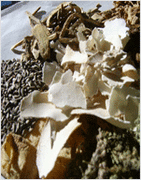Herbal Medicine

Oriental Herbal Medicine has a history which dates back more than five thousand years. Since then, it has been the primary source of natural health care in the Orient. Herbs are absorbed through the digestive tract and travel throughout the entire body via the blood stream. This is what helps them achieve a high magnitude of healing capability. In our clinic we use herbs to treat symptoms from the common cold to late stage cancer.
Writing a formula is like creating a poem. Each herb has its own unique function to support the whole bodily system. A typical herbal formula
consists of ten to fifteen herbs. Some herbs will work to reduce the symptoms directly, some herbs will counteract the harshness of other herbs, and others may focus on the source of the symptoms. Even though each herb has their own special function, it is their combined ability which makes the formula so effective. In our clinic we have approximately four hundred different raw herbs.
We rigorously inspect our herbs each day and only use the freshest and finest quality. Every one of our formulas is mixed in the clinic and unique to
everyone individual it is prescribed for. In Oriental Medicine, every herb is either named after its appearance, folklore, or its special function.
Herbal therapy has its deep root in the history of China. Emperor Huang Di (appx. 2500 B.C.) in a dialogue with his physician,initiated the modern understanding of what herbal medicine is today. This treatise is read not only by doctors but also the general population in Asia. Herbs, like people, have their own personalities. Their personality greatly depends on their upbringing.
Depending on which conditions and where they are grown can make herbs either mild or strong in nature. Although the main focus of the herbs is “Bu” (strengthening), they are also used as antitoxins “Jie-Du”. In order to determine which herbs to use, we use methods such as pulse taking, asking questions about one’s health and spirit, observing the tongue, etc. Some areas in which we work with herbs are menopausal symptoms, menstrual discomfort, lower back and joint pains, lung disorders (asthma, allergies, bronchitis), chronic fatigue, candida, bowel disorders, hepatitis, diabetes, depression and anger.Herbs help us live in harmony with our external and internal environment. Just as mother nature maintains its balance in the intricate web of life, herbs help us find balance within our own life as well.
Writing a formula is like creating a poem. Each herb has its own unique function to support the whole bodily system. A typical herbal formula
consists of ten to fifteen herbs. Some herbs will work to reduce the symptoms directly, some herbs will counteract the harshness of other herbs, and others may focus on the source of the symptoms. Even though each herb has their own special function, it is their combined ability which makes the formula so effective. In our clinic we have approximately four hundred different raw herbs.
We rigorously inspect our herbs each day and only use the freshest and finest quality. Every one of our formulas is mixed in the clinic and unique to
everyone individual it is prescribed for. In Oriental Medicine, every herb is either named after its appearance, folklore, or its special function.
Herbal therapy has its deep root in the history of China. Emperor Huang Di (appx. 2500 B.C.) in a dialogue with his physician,initiated the modern understanding of what herbal medicine is today. This treatise is read not only by doctors but also the general population in Asia. Herbs, like people, have their own personalities. Their personality greatly depends on their upbringing.
Depending on which conditions and where they are grown can make herbs either mild or strong in nature. Although the main focus of the herbs is “Bu” (strengthening), they are also used as antitoxins “Jie-Du”. In order to determine which herbs to use, we use methods such as pulse taking, asking questions about one’s health and spirit, observing the tongue, etc. Some areas in which we work with herbs are menopausal symptoms, menstrual discomfort, lower back and joint pains, lung disorders (asthma, allergies, bronchitis), chronic fatigue, candida, bowel disorders, hepatitis, diabetes, depression and anger.Herbs help us live in harmony with our external and internal environment. Just as mother nature maintains its balance in the intricate web of life, herbs help us find balance within our own life as well.
